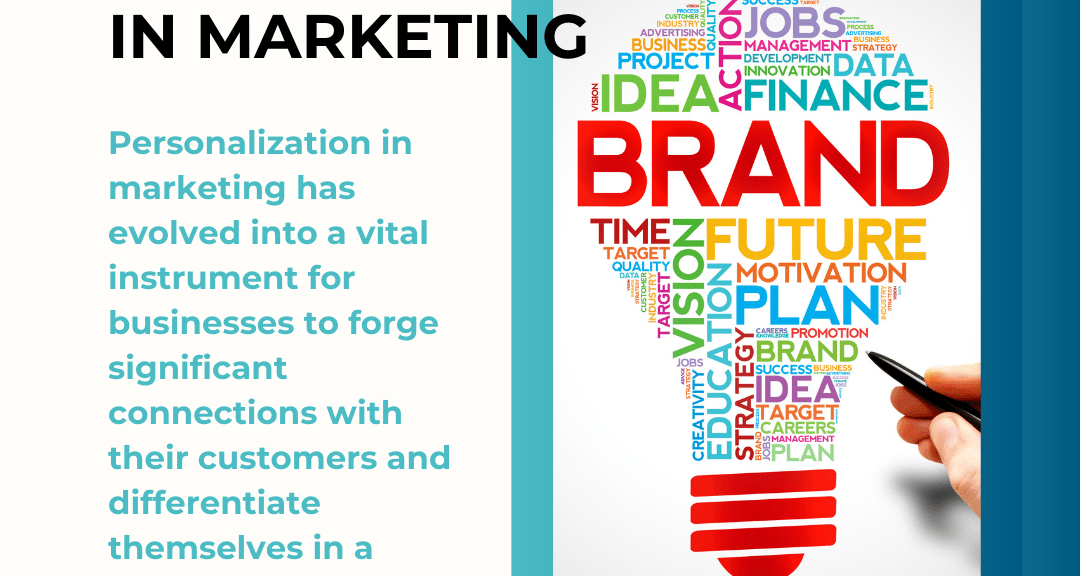In today’s hyper-connected world, where consumers are inundated with a constant stream of marketing messages, standing out from the crowd has become a significant challenge for businesses. To break through the noise and establish meaningful connections with their target audiences, personalised marketing has emerged as a powerful strategy. Personalization in marketing involves tailoring messages and experiences to individual customers’ preferences, behaviours, and needs, thereby creating a deeper level of engagement and building brand loyalty. This article delves into the importance of personalised marketing messages and experiences and provides practical ways to implement personalization strategies effectively.
The Significance of Personalised Marketing
- Enhanced Customer Experience:
Personalised marketing helps create a seamless and delightful customer experience by providing relevant content and offers that align with customers’ interests. When customers feel understood and catered to, they are more likely to engage with a brand and make repeat purchases.
- Improved Engagement and Conversion Rates:
Tailoring marketing messages to individual preferences increases the chances of capturing customers’ attention and interest. Studies have shown that personalised emails have higher open rates and click-through rates compared to generic ones, leading to better conversion rates and overall campaign success.
- Building Brand Loyalty:
Personalization fosters a sense of connection and trust between customers and brands. When customers receive personalised recommendations or exclusive offers based on their previous interactions, they are more inclined to develop loyalty towards the brand.
Practical Ways to Implement Personalization Strategies
- Collect and analyse Customer data:
The foundation of personalised marketing lies in understanding your customers better. Gather data from diverse sources, including website interactions, purchase history, social media engagements, and surveys. Analyse this data to identify patterns and preferences that can guide your personalization efforts.
- Segment Your Audience:
Divide your customer base into smaller segments based on shared characteristics, interests, and behaviours. This segmentation allows you to create targeted marketing messages tailored to each group’s unique preferences, increasing the chances of resonating with the audience.
- Personalised Email Campaigns:
Leverage the power of email marketing by sending personalised messages to your subscribers. Use their names, recommend products based on past purchases, and send birthday offers or anniversary discounts. Additionally, automation tools can help streamline this process.
- Dynamic Website Content:
Implement dynamic content on your website to display personalised product recommendations, content, or offers based on each visitor’s browsing history. This approach ensures that visitors see the most relevant information, encouraging longer browsing sessions and higher chances of conversion.
- Personalization through AI and Machine Learning:
Embrace artificial intelligence and machine learning technologies to deliver real-time personalization. These technologies can analyse vast amounts of data quickly, enabling you to offer personalised experiences at scale.
- Tailored Social Media Advertising:
Social media platforms offer robust targeting options that allow you to deliver personalised ads to specific audience segments. Use this feature to display relevant content and promotions based on users’ interests and behaviours.
- Personalised Content Marketing:
Create and distribute content that speaks directly to your different audience segments. This could include blog posts, videos, or social media content that addresses their pain points, interests, and aspirations.
- Loyalty Programmes and Customer Rewards:
Implement loyalty programmes that offer rewards and discounts based on customers’ purchase histories. Personalise these offers to ensure customers feel valued and appreciated for their continued support.
Conclusion
To conclude, personalization in marketing has evolved into a vital instrument for businesses to forge significant connections with their customers and differentiate themselves in a competitive marketplace. By understanding the significance of personalised marketing messages and experiences and implementing practical strategies, businesses can enhance customer experiences, boost engagement and conversions, and foster long-term brand loyalty. Embracing data-driven technologies and adopting a customer-centric approach are essential for successful personalization initiatives. As technology continues to evolve, personalised marketing will only become more powerful, enabling businesses to build stronger and more profitable relationships with their customers.


